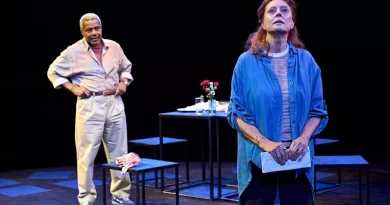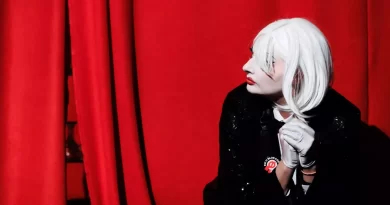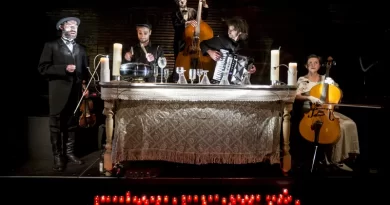“We Are the Lions, Mr Manager!”, Brighthelm Centre, Brighton
Jeremy Malies in East Sussex
8 November 2025
★★★★☆
You wait 49 years for a play about the Grunwick Dispute of 1976 and then two come along at once! (Well, more or less.)

Photo courtesy Townsend Theatre Productions.
Neil Gore’s script about a walk-out and strike action at a film processing facility in the north-west London borough of Willesden spoke to me intensely at many levels. The project is, to an extent, verbatim theatre and an example of the highest order in this genre with Gore proving inspired in how he filters archive material to focus on moments of intense human interest and acts of empathy between workers.
The writer is supported by an impressive creative team, notably director Louise Townsend who, in this multi-tasking company, has also chosen and assembled the video footage which is a major component. The research in advertising and news archives to find clips with the most telling social details has impressed audiences across the country as the show tours.
An opening Kodak Instamatic advert with its jaunty tune by Mungo Jerry (no doubt exerting extra influence because I remembered it across exactly 50 years) had me in tears. As keen photographers and Kodak loyalists, my father and I (he wearing the same vile check jackets and kipper ties sported by Gore as the male actor) posted many rolls of film to Bonusprint, this being a Grunwick brand.

Photo credit: Simon Jenner.
The video early on includes American chat show host Dick Cavett (taking his programme to London for a week) with Enoch Powell and Jonathan Miller on the couch discussing immigration. The Grunwick workers were predominantly Indian, but many had already been part of a diaspora to countries such as Kenya, Tanzania and Uganda. Fifty thousand Indians had left Uganda after Idi Amin’s 90-day expulsion order of 1972.
The principal striker (portrayed here in a staggering two-hour display of virtuosity by Rukmini Sircar) was Jayaben Desai from Gujarat who, as a 23-year-old, had moved to Tanzania in 1956. She followed her husband to London in 1967 and began processing film as part of a huge team in sweatshop conditions for affluent Anglo-Indian George Ward. A feature of the script (brought out by Townsend) is that Ward used his knowledge of Indian society to exploit his workers.
Grunwick was implementing a 1970s version of the gig economy. Workers had no job security but, quite possibly because of the innately strong work ethic of the staff, the film processing and printing were of a high standard leading to a rave review in Which? magazine. (One of the many evocative props by Amelie Gore is the relevant issue – it is thrust at us by a Grunwick middle manager.) Joining a union was out of the question, overtime was mandatory if orders required it, and no doubt lay-offs would have been automatic if business had slackened. “I can get a Patel for £15” was a George Ward quip.
Be it wielding a banner, addressing colleagues, sparring with management, speaking to a selection of trade unionists, media, police and trade bodies, Sircar is luminous, resourceful, spontaneous and technically assured. She makes her character withering when accusing Grunwick of running a zoo rather than a factory, and grandiose when quoting from Bengali poet Rabindranath Tagore or recalling Rani Lakshmibai, the queen of Jhansi during the Indian Rebellion of 1857. As embodied by Sircar, Jayaben Desai could almost be her spirit summoned for another battle. At other times she moves from the almost mythic to the quotidian such as the grind of getting up to be on the picket line every morning at six for hundreds of days non-stop. I marvelled as the actor shows her character’s cogs whirring when she finally realizes that strike pay might be a possibility.
One of the many details that caught me by the throat was the fact that the Union of Post Office Workers told its members to simply let Grunwick’s mail accumulate in sacks at a sorting office in Cricklewood. You have to think that the exclusively white (documented fact) postal staff in the area might have struggled to point on the map to the East African countries from which many of the Indian workers had migrated. But this dispute was about societal structures that transcended ethnicity. Desai and other characters in the play speculate on how positive the future would be if workers all cared about each other enough to act as one. And yet there is worker solidarity through a great deal of this narrative and no more so than in the songs by Jack Warshaw and Leon Rosselson performed by Gore.
The stakes in the dispute rose when Sandhurst-educated John Gouriet sought to disrupt the union tactic of “blacking” the Grunwick mail. Prominent in the National Association for Freedom (NAFF) which had been created the previous year, Gouriet campaigned against trade union militancy and what he saw as assaults on individual freedom. The heightened Received Pronunciation needed to convey this character’s patrician haughtiness is the one task that stretches Gore across the multiple identities he assumes convincingly.
The strike and associated unrest continued until June 1978. Gore stresses how it became a cause célèbre and media circus with nightly news bulletins. The videography includes this and hints at police presence with silhouettes. When PC Trevor Wilson was hit by a bottle during picketing, Desai’s innate decency prompted her to visit the hospital. Of course, she could get nowhere near him for the scrum of red-top tabloids wanting to get the wrong kind of picture and headline.
Does Gore’s writing sit with other established works? Waiting for Leftie by Clifford Odets comes to mind in terms of social relevance as does Jitney by August Wilson seen recently at the Old Vic. If many of my reactions to all this are pure reflex and personal memory then no matter, it’s surely a positive reflection on the playwright’s demotic approach and ability to catch a zeitgeist. He also manages to avoid being saccharine when dealing with material where this could so easily be a pitfall.
There was a lot to pack in, but I could have done with a postscript about the truly remarkable Desai who died in 2010 at the age of 77. She had become a teacher at Harrow College and passed her driving test as a 60-year-old. Theatre criticism can often be too cerebral. For once I left a hall in my home town profoundly moved.
Tour dates:
- Nov 11 – The Atckinson Southport (CC) + South Asian Dance
- Nov 13 – Marsden Mechanics Marsden Huddersfield (CC)+ Choir + South Asian Dance + Q & A + Exhib
- Nov 14 – Marsden Mechanics Marsden Huddersfield (CC) + Choir + South Asian Dance + Q & A + Exhib
- Nov 15 – Wellingborough African Caribbean Association (CC)
- Nov 18 – The Place Theatre Bedford (CC)
- Nov 19 – The Curve Theatre Leicester (CC)
- Nov 20 – Seven Arts Theatre Leeds NEU event (CC)
- Nov 21 – Seven Arts Leeds NEU event (CC)
- Nov 24 – Edmund Kell Unitarian Church & Elizabeth Kell Community Hall (CC)
- Nov 26 – Sands Film Studios Rotherhithe London (CC)
- Nov 27 – Sands Film Studios Rotherhithe London (CC)
- Nov 28 – Sands Film Studios Rotherhithe London (CC)
- Nov 29 – Willesden Green Library (Performance space), London NW10 (CC)
- Dec 1 – Fenton Town Hall Ballroom – Stoke-On-Trent
- Dec 3 – St John the Baptist Church Hall, Bathgate, Scotland (CC)
- Dec 4 – Blantyre Miners Welfare, Scotland (CC)
- Dec 5 – Irvine No 1 Celtic Supporters Club, Irvine Scotland (CC)
- Dec 6 – United reform Church, Rutherglen Scotland (CC)









